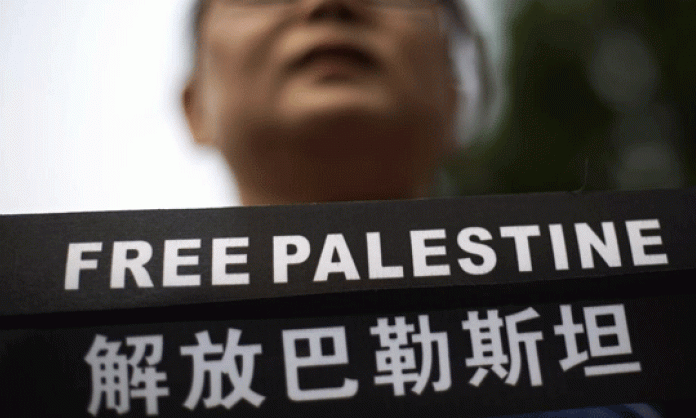Demonstrations of anger and mourning have swept the globe. Hundreds of thousands marched, chanted and occupied the streets of cities across Europe, the Middle East, Africa, the Americas and Asia in protest at the massacre of more than 500 Palestinians by apartheid Israel.
In Europe, the largest mobilisations were in England and France. Thousands took to the streets of Paris after the government attempted to ban pro-Palestine rallies. In the name of “peace” and “social calm” the social democratic government ordered police to quash solidarity in Paris. This order amounted to an endorsement of Israel’s actions. In true French tradition, some demonstrators built barricades from Parisian cobblestones and set cars on fire as they clashed with riot police.
The Israeli embassy in London was swamped by the largest ever pro-Palestine protest in the country’s history. Up to 100,000 people gathered to demand the British government break ties with Israel. London resident Roksana Ali, speaking to the Socialist Worker newspaper, said, “Most governments in the world help Israel and say they are just defending themselves but against what? The siege must end and the borders open to give the people of Gaza a chance to live some kind of reasonable life. And our government needs to stop selling Israel weapons.”
In Turkey, a smaller but no less passionate group of protesters stormed the Israeli embassy. One protester shimmied up the embassy flagpole, removed the Israeli flag and hoisted the Palestinian flag.
In Chile, 5,000 protested in Santiago, which is home to a sizable Palestinian Arab community. The march went to the Israeli embassy, where some participants glued pictures of children killed in the attacks to the walls of the building. The marchers continued on to the embassy of the United States, Israel’s closest ally.
In Australia, more than 15,000 hit the streets – 250 in Canberra, 1,000 in Adelaide, 3,000 in Melbourne, 400 in Perth, 1,500 in Brisbane and 10,000 in Sydney. These were the largest mobilisations since Operation Cast Lead in 2008-09. After another week of trauma in Gaza, many of the demonstrations were highly emotional. Amal Najjar, a 12-year-old girl whose family is from Gaza, spoke in Melbourne. Grief swept the crowd as she spoke:
“Today I am here to tell you my story. If you look at me or hear me, you wouldn’t be able to see who I am. I am Shuwaiki and Qakaon. I am Toul Karem. I am a refugee of al-Nakba. My grandfather was a carpenter in his town. The massacres struck, the blood filled the streets, and my father’s family found themselves in Kuwait then Jordan.
“My mother’s family fled to Saudi Arabia then Jordan. I was born in Australia, but I will never forget my history. I will never forget how people are being wiped out. I am Palestinian. I am resistance. I am here today even though Israel wants to crush me. I saw the four children killed on the beach in Gaza from the Bakr family. I will never enjoy going to St Kilda beach after I saw my brothers get slaughtered like this. Why. Why do they kill us? Why do they lie to the whole world?”
Other speakers expressed their disgust at the bipartisan support in Australia for Israel. Protesters in Sydney chanted “Tony Abbott, you can’t hide, you’re supporting genocide!” Socialist Alternative and Palestine Action Group activist Damian Ridgewell chaired the rally. “We condemn both the Labor and the Liberal party for their unequivocal backing of Israel’s war crimes,” he said. “We call the Australian government to break all political, economic and military ties with Israel.”
Melbourne Egyptian activist Mohammed Helmy condemned the Arab regimes for their refusal to aid the Palestinians – in particular he called on Egypt to open the Rafah crossing to Gaza and allow crucial supplies into the territory.
All speakers urged protesters to return to the streets the next weekend.
End the invasion, end the blockade
Perth: Saturday 26 July, 11am at Murray St Mall
Brisbane: Saturday 26 July, 2pm at King George Square
Melbourne: Saturday 26 July, 1pm at the State Library
Adelaide: Saturday 26 July, 12pm at the Parliament
Sydney: Sunday 27 July, 1pm at Sydney Town Hall










